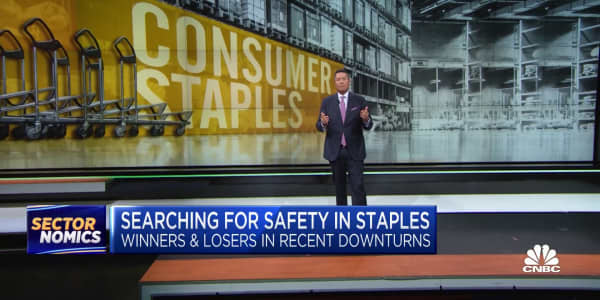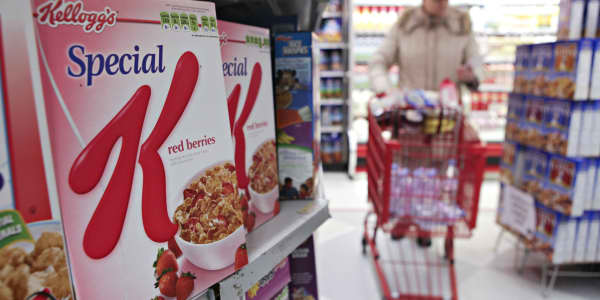Macho men beware, a grave threat to your way of life has risen across the land: "mampering."
Men have begun adopting the same grooming habits as women. Many are still reluctant to use products traditionally targeted to females, but the beauty industry is betting that's going to change—that today's modern man will be willing to trade up from traditional unisex brands and pay a higher premium for products specifically tailored to fit their lifestyle.
There are signs it's working.
"The unisex products are becoming more obsolete," said Gabriela Elani, home and personal care analyst for market research firm Mintel.
Since 2012, beauty and personal care launches specifically targeted at men have increased globally by more than 70 percent, according to Mintel. In 2014, total U.S. sales for the men's personal care market hit $4.1 billion, up 6.7 percent from 2012 and 19 percent from 2009, making it one of the fastest-growing segments of the beauty industry. Mintel predicts sales will grow to $4.6 billion by 2019.
"Men want an upgraded experience," said Matthew McCarthy, senior marketing director of antiperspirants and deodorants at Unilever, who has also been instrumental in the company's skin and hair care brands. "Guys are more discriminating today than ever. They want quality and personalization that meets what they are looking for," he said.
Read MoreHot holiday gifts for her in 2014
One hundred million dollars a year in sales growth to 2019, and the slower growth over the next five years may not seem like a sales juggernaut, but the mampering trend comes at a time when many traditional personal care categories for both men and women are showing flat sales. And the slowing growth overall in the personal care market makes new, targeted products critical to the industry.
Antiperspirant and deodorant have traditionally been major drivers of growth, but Mintel states that the men's skin care segment—which consists of body care and facial care products—has experienced the most significant increase, with sales gains of 57 percent from 2009 to 2014. The smallest segment? Hair care.
Top-selling men's personal care products
- Deodorant/antiperspirant
- Shampoo
- Bar soap
- Shaving gel/cream
- Shower gel
- Moisturizing lotion/cream
- Conditioner
- After-shave
- All-in-one shower product
- Facial cleansing products
- Facial moisturizers
(Source: Mintel, 2014)
Mampering's momentum
So what is behind the rise of mampering?
Primarily driving the charge are the male millennials, now moving into the 25-plus age group. "Younger guys are willing to try lots of stuff because they are growing up in a world where it's OK to care about your grooming," McCarthy said. "Men have been engaged in grooming products for hundreds of years, but it used to be around fragrance and shaving. Now it's become so much more than that," he added.
Read More10 must-have video games for this holiday season
Much of the growth has been supported by social media.
"Guys now have access to a massive palette of inspiration because of their connection to the world around them," McCarthy said. "When I was younger, I could only look at my peer group—my brother, his friends, my friends—and I would pick up clues and cues from them to develop my own personal sense of style. Guys today are connected globally. So if there's a really cool trend happening in Brazil or Japan, guys can find that out right away."
They are not just simply female prestige products we've put into a dark-colored package. Creating both brands and products that are designed with guys in mind is the core part of our success.Matthew McCarthysenior marketing director of antiperspirants and deodorants at Unilever
Elani also believes that the population growth among the U.S. Hispanic and black communities—expected to increase 14 percent and 7 percent, respectively, by 2019—continues to be a positive driver for the male personal care market. "They 'overindex' in their use of different types of personal care products, most notably body care and facial skin care products," the Mintel report said.
Overall, 59 percent of American men say personal care products boost their self-esteem, and 28 percent say they are concerned about dry skin and visible signs of aging. Thirty-seven percent use facial cleanser as part of their regular grooming routine, while 22 percent use exfoliating scrubs, 17 percent rely on anti-aging products and 12 percent use eye cream.
Groomed for success?
While companies such as L'Oreal and Beiersdorf have channeled substantial investment into their Men Expert and Nivea Men skin care lines, respectively, and are seeing growth, men still believe these companies are associated with women. "The traditional men's products are doing incredibly well," Elani said. "Old Spice, Axe, Dove Men+Care. These brands are known for that."
Elani said that in order to continue growing men's grooming at an accelerated pace, brands need to keep integrating new functional benefits and attributes into male-specific products—for example, men have thicker and more oily skin and so creams can be prepared specifically for men rather than just repackaging existing women's skin creams.
"They are not just simply female prestige products we've put into a dark-colored package," McCarthy said. "Creating both brands and products that are designed with guys in mind is the core part of our success."
Read MoreNow you can rent ugly holiday sweaters
Time is also of the essence, and the personal care companies need to offer time-saving benefits, as most men want their grooming routine to run no more than 30 minutes—for example, combining several products into one, such as a combined shampoo, conditioner and body wash. Some body washes now offer built-in deodorant protection as well.
For the time being, Unilever and Procter & Gamble remain the market leaders for men's grooming, accounting for 62 percent of men's personal care product sales, according to the Mintel report. P&G maintains its control in men's grooming through well-known brands such as Gillette, Old Spice and Clairol for Men. Unilever's Axe is currently the largest men's grooming and fragrance brand in the world, excluding shave, and its Dove Men+Care is the fastest-growing brand in men's personal care.





